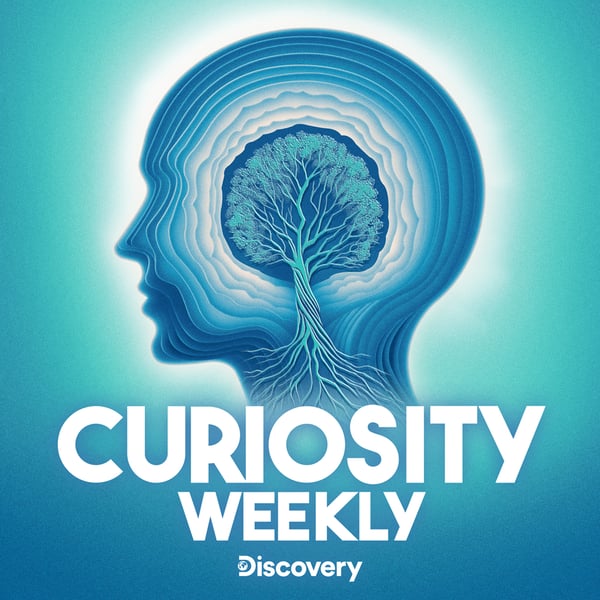The Phantom Time Hypothesis, Cybersecurity Tips, and New Schizophrenia Revelations
Curiosity Weekly
Warner Bros. Discovery
4.6 • 935 Ratings
🗓️ 21 January 2019
⏱️ 9 minutes
🧾️ Download transcript
Summary
Learn about a modern study that supports a 100-year-old hypothesis about schizophrenia; the weird “Phantom Time Hypothesis” about the history of calendars, along with some actual facts about the Middle Ages; and some tips from a computer scientist for better cyber hygeine and cybersecurity in 2019.
In this podcast, Cody Gough and Ashley Hamer discuss the following stories from Curiosity.com to help you get smarter and learn something new in just a few minutes:
- A Modern Study Supports a 100-Year-Old Hypothesis About Schizophrenia — https://curiosity.im/2Mh9AMy
- According to the Phantom Time Hypothesis, We're Currently in the 18th Century — https://curiosity.im/2MfAIf3
- 6 Tips for Better Cyber Hygiene from a Computer Scientist — https://curiosity.im/2MjhtkY
Pick up “Mason & Dixon: A Novel” on Amazon. If you make a purchase using this link, then Curiosity gets a share of the sale! https://amazon.com
If you love our show and you're interested in hearing full-length interviews, then please consider supporting us on Patreon. You'll get exclusive episodes and access to our archives as soon as you become a Patron! https://www.patreon.com/curiositydotcom
Download the FREE 5-star Curiosity app for Android and iOS at https://curiosity.im/podcast-app. And Amazon smart speaker users: you can listen to our podcast as part of your Amazon Alexa Flash Briefing — just click “enable” here: https://curiosity.im/podcast-flash-briefing.
Find episode transcript here: https://curiosity-daily-4e53644e.simplecast.com/episodes/the-phantom-time-hypothesis-cybersecurity-tips-and-new-schizophrenia-revelations
Hosted on Acast. See acast.com/privacy for more information.
Transcript
Click on a timestamp to play from that location
| 0:00.0 | Hi, we're here from Curiosity.com to help you get smarter in just a few minutes. |
| 0:05.0 | I'm Cody Gough. |
| 0:06.0 | And I'm Ashley Hamer. |
| 0:07.0 | Today, you learn about a modern study that supports a hundred-year-old hypothesis about schizophrenia, |
| 0:12.0 | a weird, probably made-up theory about the history of |
| 0:14.4 | calendars, along with some actual facts about them, and some tips for better |
| 0:18.3 | cyber hygiene from a computer scientist. |
| 0:20.6 | But satisfy some curiosity on the award-winning curiosity daily. |
| 0:24.2 | A recent study supports a very old hypothesis about the causes of schizophrenia, and it could |
| 0:29.2 | change the way we look at the disorder. |
| 0:31.3 | We'll start this episode with a mix of history and science. |
| 0:34.0 | First, the history. In the late 19th and early 20th centuries, one of the world's |
| 0:38.6 | premier psychologists was named Emil Kraplin. He specialized in a disorder called dementia pre-Cocks, |
| 0:44.9 | which today we call schizophrenia. |
| 0:47.1 | From 1896 up until his death in 1926, |
| 0:50.6 | Craplin believed the disorder was what he called a whole body madness. |
| 0:55.0 | In other words, schizophrenia isn't just in the brain, it also has a strong physical component. |
| 1:00.0 | Now, the association between schizophrenia and poor physical health isn't controversial. |
| 1:05.0 | Doctors have seen for a long time that people with schizophrenia live about 10 to 20 years |
| 1:09.2 | less than people without it, and the disorder is associated with an increased risk of other health problems, including heart disease, diabetes, and suicide. |
| 1:17.0 | Most modern doctors have assumed that this association went in one direction. |
| 1:21.0 | For example, schizophrenic people often face homelessness and other factors that put their health at risk. |
... |
Please login to see the full transcript.
Disclaimer: The podcast and artwork embedded on this page are from Warner Bros. Discovery, and are the property of its owner and not affiliated with or endorsed by Tapesearch.
Generated transcripts are the property of Warner Bros. Discovery and are distributed freely under the Fair Use doctrine. Transcripts generated by Tapesearch are not guaranteed to be accurate.
Copyright © Tapesearch 2025.

